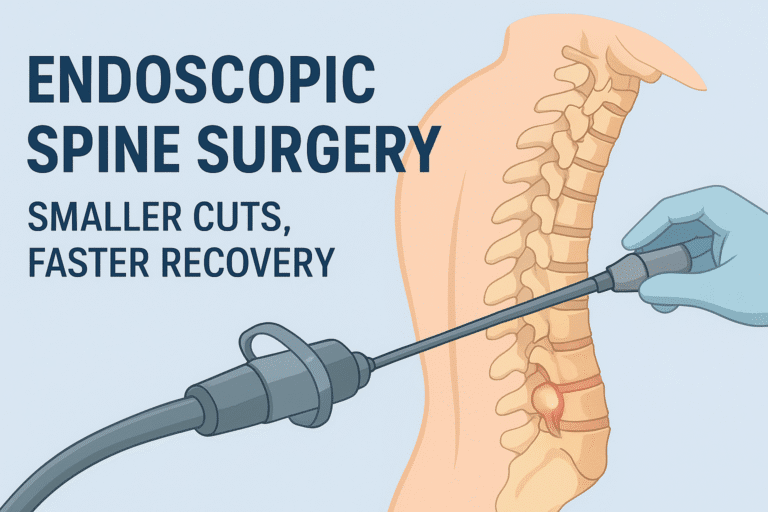Dr. Mrugank Narvekar
MBBS, MS(ORTHO), FISS, F.AOSPINE
Faster Recovery, Less Pain: Why Endoscopic Spine Surgery Is the Future of Spine Care

Back and neck pain are among the most common health issues faced by people today. While traditional spine surgeries often involve large incisions, longer hospital stays, and extended recovery times, endoscopic spine surgery has transformed the way spinal conditions are treated.
This minimally invasive spine surgery technique allows patients to recover faster, experience less pain, and return to their normal lives much sooner — making it one of the most advanced and patient-friendly options for spine problems today.
What is Endoscopic Spine Surgery?
Endoscopic spine surgery is a minimally invasive procedure that uses a small tube-like camera (endoscope) and specialized surgical instruments to treat spinal problems through tiny incisions, usually less than 1 cm.
The endoscope provides a magnified, high-definition view of the affected area, allowing the surgeon to perform precise surgical corrections without damaging surrounding muscles or tissues.
Common conditions treated with Endoscopic Spine Surgery:
- Herniated or slipped discs
- Sciatica
- Spinal stenosis
- Disc prolapse
- Nerve compression
- Degenerative disc disease
Advantages of Endoscopic Spine Surgery
- ✅ Smaller Incisions, Minimal Scarring
Only a tiny incision is required, reducing the risk of infection and leaving almost no visible scar. - 🕒 Faster Recovery Time
Most patients can walk within a few hours after surgery and return home the same or next day. - 💪 Less Pain & Blood Loss
Because muscles and tissues are not cut extensively, postoperative pain and blood loss are significantly less. - 🏠 Shorter Hospital Stay
Endoscopic spine surgery is often performed as a day-care procedure or with just an overnight stay. - 🎯 High Precision with Advanced Visualization
The use of an endoscope allows the surgeon to visualize the surgical area in great detail, improving accuracy. - ⚡ Early Return to Work and Routine
Patients typically resume light activities within a few days and normal work in a few weeks.
How is Endoscopic Spine Surgery Performed?
- A small incision (less than 1 cm) is made on the skin.
- The endoscope is inserted through the incision to reach the affected spinal area.
- Using high-definition imaging, the surgeon identifies the problem (e.g., disc herniation).
- Specialized instruments are used to remove or repair the damaged tissue.
- The incision is closed with minimal or no stitches.
This entire process usually takes 30–90 minutes, depending on the complexity of the condition.
Who is a Good Candidate for Endoscopic Spine Surgery?
You may be a good candidate if you:
- Have persistent back or leg pain not improving with medicines or physiotherapy
- Have a confirmed disc herniation, nerve compression, or spinal stenosis on MRI
- Want a less invasive alternative to open spine surgery
- Are medically fit for anesthesia
Your spine surgeon will perform a detailed evaluation, including clinical examination and imaging studies, to determine if this technique is right for you.
Recovery and Aftercare
- Most patients walk the same day or the next day after surgery.
- Light activities can resume within a week.
- Heavy lifting or strenuous exercises should be avoided for 4–6 weeks.
- Regular follow-ups and guided physiotherapy help ensure a smooth and lasting recovery.
Frequently Asked Questions (FAQ)
1. Is endoscopic spine surgery safe?
Yes. When performed by a qualified and experienced spine surgeon, it is a safe and highly effective procedure with minimal risks compared to open spine surgery.
2. How long is the recovery period?
Most patients recover within 2–4 weeks, depending on their overall health and the nature of their spinal condition.
3. Will I have a visible scar after surgery?
No. The incision is very small (less than 1 cm), and most patients have almost no visible scar after healing.
4. Is hospitalization required?
Usually not. Most endoscopic spine surgeries are performed as day-care procedures or require only an overnight stay.
5. Can endoscopic spine surgery treat all spine problems?
While highly effective for disc herniations, stenosis, and nerve compression, it may not be suitable for complex spinal deformities or instability. Your spine surgeon will guide you to the best option.
Conclusion
Endoscopic spine surgery represents the future of spine care — combining cutting-edge technology, minimal invasiveness, and faster recovery. If you are struggling with chronic back or leg pain that hasn’t improved with non-surgical treatments, it’s time to consult an spine surgeon to explore whether endoscopic spine surgery is right for you.
